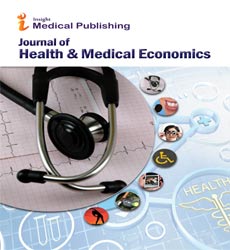Scope in Health Economics
Mike Smith
Mike Smith*
College of Medicine, University of Nigeria, Enugu, Nigeria
- *Corresponding Author:
- Mike Smith
College of Medicine, University of Nigeria, Enugu, Nigeria
E-mail: smithmike98@gmail.com
Received Date: September 01, 2021; Accepted Date: September 06, 2021; Published Date:September 10, 2021
Citation: Smith M (2021) Scope of Health Economics. J Health Med Econ. Vol.7 No.5:63.
Editorial
Health economics is a branch of economics concerned with issues related to efficiency, effectiveness, value and behaviour in the production and consumption of health and healthcare. Health economics is important in determining how to improve health outcomes and lifestyle patterns through interactions between individuals, healthcare providers and clinical settings. In broad terms, health economists study the functioning of healthcare systems and health-affecting behaviours such as smoking, diabetes, and obesity.Economics is the study of how men and society end up choosing with or without the use of money to employ scarce productive resources, which would have alternative uses to produce various commodities and distribute them for consumption now or in future among various people and groups in society. Economics is all about resource use. The assumptions of economics are that resources are limited and demands for resources are unlimited. For every resource use, choice is to be made from among the competing alternatives. When a resource is used for a purpose, the opportunity to use it for something else is lost and this is the concept of opportunity cost. The value of resources which is called cost can be measured in quantitative terms.
The concepts of efficacy, effectiveness and efficiency are important in health economics. Achievement of stated goal for an intervention, when used in optimal conditions is called efficacy. The demonstration, that an intervention does more good than harm when used in usual or actual circumstances is effectiveness. When a patient or the physician takes a decision, the important concern is whether the patient gets the best outcome for the resources incurred. This is efficiency, which is the maximum level of effectiveness obtained at the lowest cost. Generally clinicians need to make choice to favour the most efficient option. Efficiency at the individual level can be considered as utility maximization for the consumer. Thus health economics is important for the physician, primarily because of efficiency concerns.
As health economics is becoming more and more visible, the application in health sector is more appreciated than that in any other contemporary fields. This will certainly lead to more debates and dialogs based on conclusions from reliable data on expenditure and outcomes. Making choices in the setting of limited resources, either for the individual patient in a clinical setting or for public health decision making by the administrator are becoming more and more challenging and distressing to the ignorant physician because, available support materials enable the critics to become more aggressive and to take over to drive the wagon. This perhaps forces the physician to go in search of the esoteric concepts of health economics. By all means it is better that physician or administrator, also become aware of these support tools from health economic literature. Policy makers should facilitate capacity building of health professionals through creating more training opportunities and making infrastructure facilities readily available. In that case the physician will be all the more happy to collaborate with a pure economist who approaches the former for studying health sector. Such partnerships only will benefit the society through development of health economics as an august discipline.Health economics is a branch of economics concerned with issues related to efficiency, effectiveness, value and behaviour in the production and consumption of health and healthcare. Health economics is important in determining how to improve health outcomes and lifestyle patterns through interactions between individuals, healthcare providers and clinical settings. In broad terms, health economists study the functioning of healthcare systems and health-affecting behaviours such as smoking, diabetes, and obesity.
Open Access Journals
- Aquaculture & Veterinary Science
- Chemistry & Chemical Sciences
- Clinical Sciences
- Engineering
- General Science
- Genetics & Molecular Biology
- Health Care & Nursing
- Immunology & Microbiology
- Materials Science
- Mathematics & Physics
- Medical Sciences
- Neurology & Psychiatry
- Oncology & Cancer Science
- Pharmaceutical Sciences
